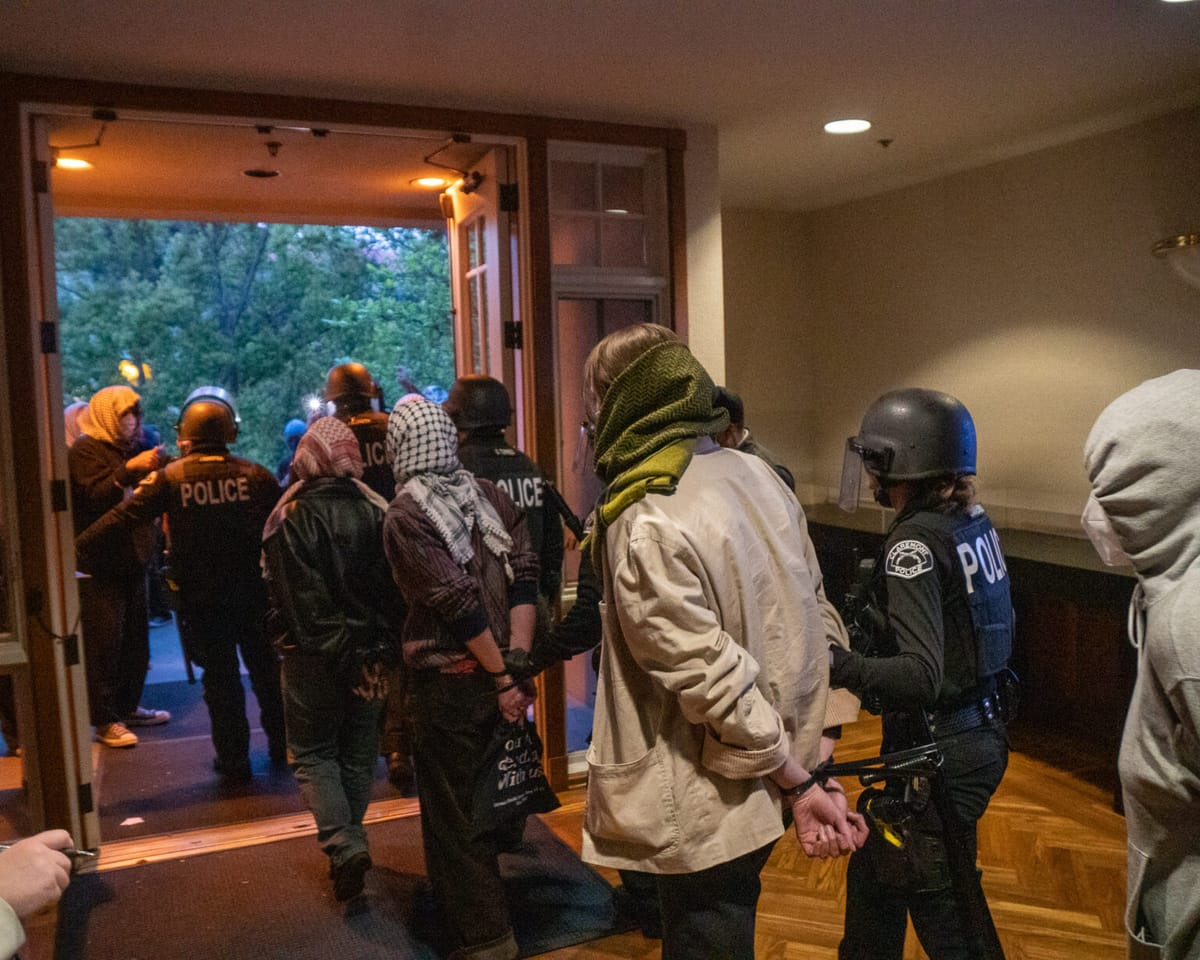Pomona College student protestors remain “resolute” in divestment efforts following arrests

Pomona College has come under fire after a pro-Palestinian demonstration turned chaotic. Nineteen student protesters were arrested outside of the college’s administration office for trespassing on Friday, April 5.
Students gathered in protest at Alexander Hall on Pomona’s campus targeting the apartheid in Israel and the institution's investments in weapons manufacturers. The demonstration, led by the student coalition Pomona Divest from Apartheid (PDfA), which has pressured the college to honor the divest referendum passed by students, escalated when over 30 police officers in riot gear arrested the students.
“It was traumatizing as a black person being thrown in jail by Gabrielle Starr and Pomona College’s administration for simply participating in civil disobedience,” Pomona College student Sinqi Chapman said in a telephone interview. “I was thrown in a cell like an animal — it was dehumanizing; I was denied the right to a lawyer.”
The Claremont Police Department released a statement on April 6, stating that Pomona College’s administration requested the intervention. The charges against the students included trespassing, with one individual arrested outside the building on the additional charge of obstructing justice.
While the Claremont Police Department received the initial call, officers from La Verne, Azusa and Covina also arrived at the scene.
The protest was sparked by the college's removal of a pro-Palestinian art installation, known as the "apartheid wall," which had been present on Pomona’s campus since March 28. The installation aimed to draw attention to the Palestinian cause and the college's refusal to divest from companies associated with Israel.
According to lawyer James P. Seagull-Gutierrez, the students were neither read their Miranda rights nor allowed legal counsel. Gutierrez explained that he had tried to speak to the students, but he was kept from doing so.
“I’ve been practicing law for over 20 years, and this has never happened,” Gutierrez said. “This is fascism.”
Claremont Lieutenant Robert Ewing said in an email that, “there were a few reasons why Mr. Seagull-Gutierrez was not permitted to speak with any of the students at the Claremont Police Department.”
Ewing explained that the lobby “closed at 6 p.m. that evening,” and that there were “no lobby staff to monitor who would come into the lobby and answer any requests to speak with anyone within the jail.”
“There is an intercom to the front of the station and Mr. Segall-Gutierrez could have used that to speak with a dispatcher regarding his request,” Ewing said.
Regarding the Miranda issue, Ewing continued and explained that in order for a Miranda advisal to be issued, “The individual must be in custody and interrogated or questioned.”
“This was not the case,” Ewing said. “No interrogation or questioning of the students took place, which negated the need for a Miranda warning.”
However, students dispute the claim that they were not questioned.
Following their release from custody, the suspended students faced restrictions from campus activities and facilities, sparking concerns about their well-being and academic future. Despite the administration's stance, protesters remained resolute in their goals, reaffirming their commitment to divestment efforts.
“Students are calling for the administration to publicly condemn the Zionist regime, occupation and ethnic cleansing, genocide and dehumanization of Palestinians,” Chapman said. “And Jewish students on campus are also calling to institute anti discrimination policies explicitly for Palestinian, Muslim, Arab, SWANA, Black, brown and indigenous students.”
While President Starr has not responded to the Frontline's request for comment, the protest, according to the college's official website, "was not a peaceful protest, as masked individuals pushed their way past the president and other campus employees to occupy the president's office and refused to leave despite repeated warnings to do so."
The incident at Pomona College reflects a broader trend of protests and arrests on college campuses across the nation in response to the Israel-Hamas conflict. Despite differing perspectives on the issue, the clash underscores the ongoing tensions surrounding divestment campaigns and freedom of expression on college campuses.
